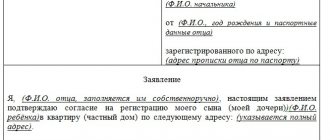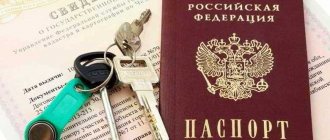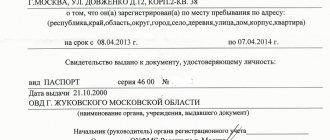Free legal consultation over the Internet 24 hoursLawyer on housing issues in St. Petersburg. Free legal consultation on labor disputes.
5/5 (2)
Legislative basis
The legislation of the Russian Federation obliges every citizen to indicate his place of residence within the country.
Federal Law No. 5242-1 of June 25, 1993 “On the right of citizens of the Russian Federation to freedom of movement, choice of place of stay and residence within the Russian Federation” contains a clearly formulated rule according to which everyone is required to have permanent or temporary registration.
Responsibility for evading it is provided for in Article 19.15.1 of the Code of Administrative Offenses of the Russian Federation. The registration procedure is also prescribed by the legislator in Government Decree No. 713 dated July 17, 1995.
How to do it?
The first thing that is necessary for registration in a hostel at the place of permanent or temporary residence of a citizen of the Russian Federation is a documentary basis. This basis, depending on the status of the resident, will be different confirmations (more on this below).
Registration without a documentary basis for a person’s residence is considered fictitious, and therefore punishable by a fine of 5 to 8 thousand rubles. (Article 19.15 of the Code of Administrative Offenses of the Russian Federation).
Where is permanent registration obtained?
Registration of residence in a hostel is completed at the representative office of the Federal Migration Service (for room owners and members of their family), passport offices of housing offices (in municipal housing), and sometimes directly on site in the hostel, where the passport officer authorized for these actions works.
List of required documents
The package of documents that will need to be collected to submit for registration is as follows:
- passport of a citizen of the Russian Federation;
- application for registration on a permanent or temporary basis;
- departure ticket from the previous address of registration and arrival;
- for registration of the owner - a certificate of ownership.
For non-owner:
- application from the owner (if the housing is privatized);
- consent of all residents (already registered here);
- order for settlement and registration (if housing is in municipal or state ownership, including university dormitories);
- social rental agreement.
Where to submit?
Depending on the department on whose balance sheet the property is located, the responsible body that performs the necessary functions is determined, and the new resident submits his documents here.
Such organizations are representative offices of the Federal Migration Service in the region, passport offices in the housing office, or documents are accepted by a passport officer on site in the hostel itself.
Registration deadlines
After the documents for registration are accepted, the entire procedure for registering a new citizen is completed within 10 days.
Cost and state duty
The housing legislation of the Russian Federation does not provide for the collection of state fees for withdrawal and registration. All procedures, as in apartment registration, are free.
What papers are issued after the procedure?
After completing registration actions, the new resident receives his passport, where, in the case of temporary registration, the final validity period of this registration may be indicated.
Registration in the hostel
To apply for permanent or temporary registration in a dormitory, you must first obtain the consent of the owner of the dormitory as a whole or of the room. An exception is the situation when a minor child is registered at the place of residence of one of the parents.
In this case, the consent of the owner or other registered persons is not required; the procedure is of a notification nature. The parent only needs to submit an application on his own behalf and attach a copy of the child’s birth certificate and confirmation of his registration.
Residential status
Residential premises according to their status are divided into three types: private, municipal and managed by a legal entity. This principle applies to apartments and households. The hostel is no exception here.
Premises to which a person has ownership rights are considered private. It is confirmed by a certificate, a purchase and sale agreement or an extract from the Unified Register of Real Estate. The law does not prohibit the acquisition of ownership rights to residential premises in a dormitory.
A municipal area is considered to be an area under the jurisdiction of budgetary structures, that is, local authorities.
Examples of housing owned by a legal entity are apartments or rooms owned by businesses or educational institutions.
The order of its provision to the interested person depends on the status of the premises.
Permanent registration
A citizen who is the owner of a room in a dormitory receives permanent registration in it without the mandatory consent of neighbors or other registered persons. If the room belongs to a municipality, you will have to obtain the consent of the municipality and the other tenants with whom you will be living together.
Moreover, even the presence of permanent registration is not a basis for prohibiting eviction on legal grounds.
This depends on the conditions under which the living space is provided for use. For example, if it is official, then after dismissal from a specific place of work the citizen is obliged to leave the room, despite the presence of a registration. If he does not vacate the premises and does not sign out voluntarily, the employer will force him through the court.
Remember! The only way to insure yourself is to privatize your home. But this is only possible with municipal housing. If the property is owned by the employer, this option is not possible.
Is it possible to register without the right of residence?
Registration initially gives a person the right to be in a certain premises. That is, in case of registration, a person acquires the right to use housing. At the same time, the legislation does not disclose such a concept as registration without the right of residence. In fact, in practice, some owners draw up agreements of this nature. However, in this case you may encounter a certain problem. Registration of this nature may be regarded by specialists of the Ministry of Internal Affairs as a fictitious registration. In this case, the person will be removed from the register.
Without accommodation
There is no legal concept of registration without right of residence. A synonym for this phrase is fictitious registration. This is an illegal fraud that is prosecuted by law.
An owner who knowingly consents to such registration may incur administrative liability and receive a fine of 2-7 thousand rubles (Article 19.15.2 of the Code of Administrative Offenses of the Russian Federation)
If such an offense is committed by a legal entity, it faces a fine of 80-500 thousand rubles, therefore, having a residence permit in a hostel and not living in it is an administrative offense. If a citizen does not live in a room, but, for example, rents an apartment, he must obtain temporary registration there.
Watch the video. Is it possible to live in a dormitory if the employment relationship with the employer is terminated:
Types of registration
Registration varies in duration. It can be temporary or permanent. It all depends on the intentions of the person himself and the conditions of settlement.
Constant
According to general rules, it occurs in cases where a person changes his residential address for an indefinite period, for example, when selling his own real estate. In such cases, it is necessary to register at the new location within the period established by law. It is seven actual days and is calculated from the moment of arrival.
In practice, registration of this type in a hostel is quite rare. This is due to the fact that residence in this premises is limited to certain periods or the occurrence of specific circumstances. That is, a person will be able to use a dorm room while he works or studies. Permanent registration will be possible if the premises are privatized with the permission of the owner, that is, when the legal entity has given consent and the resident has received ownership of the occupied space, he will be able not only to register himself on a permanent basis, but also to register his other relatives or family members .
Temporary
Temporary registration has slightly different registration deadlines. If a person intends to live at a certain address for more than ninety actual days, then before their expiration he must contact the territorial body of the Ministry of Internal Affairs. This type of registration is typical for registration in a hostel. In this case, the person will live in the premises as a tenant. That is, he will have the opportunity to stay in the hostel and use not only the room, but also the common areas and the provided utilities.
In this case, the resident is not given the right of ownership, and he will not be able to register other persons in the room only at his own discretion. He will need the owner's consent.
For the period of study
Every year, many school graduates leave their home and go to study in other cities. When moving into a dormitory, a specialist appointed by the head issues a temporary registration for each of them. It is valid for the period of study and is mandatory.
If this obligation is evaded, the administration of the educational institution receives a fine. Every student living in a dormitory is required to have a residence permit.
Typically the procedure is as follows:
- students have an indirect relationship directly to the preparation of documents;
- on the appointed day, the management gathers new residents, the latter write applications and hand over their passports;
- during the absence of the main document, a temporary identity card is issued;
- registration takes place within 7 – 10 days.
Registration or temporary registration at the place of stay in a dormitory for students
Temporary registration of students at their place of stay is mandatory.
As a rule, this is done by a passport officer, but if there is no such employee on the university staff, you can prepare the documents yourself.
To do this, you need to collect the following documents:
- statement,
- passport,
- certificate (for persons under 14 years old),
- health certificate (form o86/у4),
- compulsory medical insurance policy,
- photo 3X4 (3 pcs),
- permission to move in,
- certificate from the educational institution,
- arrival and departure sheet.
A student of military age must attach a military ID or a Form 32 certificate to the package of documents. All papers are provided to the employees of the passport office.
No room specified
Whether or not to indicate the room number on the dormitory registration certificate is a controversial issue; in practice, both options occur.
Important! If the hostel is municipal, numbering is not provided, but if a child is being registered, this nuance is required. In this case, you will need to provide a rental agreement.
There is definitely no dispute or problem in only one case: if the room has an owner, although the number may also be missing. Temporary registration is no exception - the number on the certificate is not mandatory.
Does a student need temporary registration?
According to the Constitution, a citizen of the Russian Federation can move freely around the country and have a residence permit (registration) in any region. But big brother is watching everyone. Therefore, if you are changing cities and intend to live in a hostel for more than 3 months, temporary registration is officially required. Accordingly, a nonresident student needs to register.
Why is temporary registration needed? With temporary registration, you will be able to receive medical care, officially get a job, and send your children to kindergarten on the same basis as native Muscovites. The latter is not at all relevant for students, but you never know.
Temporary registration does not cancel or annul your permanent registration in any way. There are no stamps in your passport - you will simply be given a certificate of temporary registration.
What documents are needed
The administrative regulations, approved by Government Resolution No. 822, contain a list of documents required for registration:
- passport or other identification document;
- title document for housing;
- departure slip.
Depending on the specific situation, additional documents may be required: birth certificates, marriage certificates.
Attention! Our qualified lawyers will assist you free of charge and around the clock on any issues. Find out more here.
Free registration with the Federal Migration Service
HomeServices and pricesFree registration with the Federal Migration Service
share on social networks
Have you arrived in the capital, intend to find housing in Moscow and stay here for a long time? Have you thought about the need to register with the Federal Migration Service? Are you afraid of running into scammers or don’t even know where to start? The City Hotel hostel chain offers you to solve two of the most important problems for everyone who has recently arrived in the capital:
- Rent a hostel in Moscow - inexpensive, well-equipped and safe to live in
- Free registration with the Federal Migration Service - this opportunity is provided to all our guests.
and get
Registration for visitors is a mandatory procedure. Regardless of whether you are a resident of the Russian region or a foreigner, the law requires that you register with the federal migration service. For Russian citizens, registration is necessary if a long stay outside the main place of residence exceeds 90 days; for immigrants from the CIS countries or other countries, this period is 7 working days.
The simple procedure will not take much time.
Required documents
In most cases, only a passport.
But sometimes other documents are needed. All details can be obtained from the hostel accommodation manager.
Registration process. Three simple steps
- First, you will fill out an arrival and departure form - in electronic or handwritten format, as well as an address slip. If you are not sure that you can avoid annoying inaccuracies, we recommend that you seek help from our specialists.
- Then the manager sends the documents to the Main Directorate for Migration of the Ministry of Internal Affairs of Russia in Moscow, where the submitted data is verified. Processing the application may take different times, it all depends on whether you arrived from the regions of the Russian Federation or from abroad.
- After our staff confirms the date when the temporary registration in Moscow will be ready, you will be able to pick up the form. All this is done while you have already checked into the hostel - you do not need to wait to receive documents.
If you live in our hostel and would like to receive more detailed information on registration issues, please call: 8-916-597-95-08
Helpful information
Registration of citizens of the Russian Federation with the Federal Migration Service In accordance with the legislation of the Russian Federation regarding migration registration, a citizen of the Russian Federation who arrives in a residential building for temporary residence that is not his place of residence (permanent registration) for a period of more than 90 days is required to register at the place of stay.
To put it simply, obtaining temporary registration at the place of residence is a mandatory procedure for everyone who decides to stay in the capital for a long time.
Registration at the place of residence ensures:
- Opportunity to get an official job under the Labor Code of the Russian Federation
; - Opportunity to open a current account
,
bank card or get a cash loan
; - Possibility to register at a clinic in the registration area
; - Passing exams for the right to drive a car or change your driver's license
.
Registration of foreign citizens with the FMS On March 25, 2011, Federal Law No. 42-FZ “On Amendments to the Federal Law “On Migration Registration of Foreign Citizens and Stateless Persons in the Russian Federation” and certain legislative acts of the Russian Federation” came into force, namely:
- A foreign citizen or stateless person must register for migration at the place of stay within 7-15 working days from the date of arrival, instead of 3 according to the amendments to Art. 20 of the Federal Law of July 18, 2006 No. 109 “On migration registration of foreign citizens and stateless persons in the Russian Federation”
. - Foreign citizens who are not registered at their place of stay are not subject to administrative liability in accordance with the Code of Administrative Offenses of the Russian Federation
for violating the rules of migration registration, except in cases where the obligation to provide information about their place of stay is assigned to the corresponding foreign citizen (
in accordance with the addition to clause 2 Article 24 of the Federal Law of July 18, 2006 No. 109-FZ “On migration registration of foreign citizens and stateless persons in the Russian Federation”
). - The place of stay of a foreign citizen or stateless person in the Russian Federation (hereinafter referred to as the place of stay) means a residential premises that is not a place of residence, as well as other premises, institution or organization in which the foreign citizen or stateless person is located and (or) at the address which a foreign citizen or stateless person is subject to registration at the place of stay.
The basis for registration with migration authorities is:
- The fact of entry
of a foreign citizen into the Russian Federation; - The fact of registration of birth
on the territory of the Russian Federation of a foreign citizen or other person who did not acquire Russian citizenship at the time of birth; - The fact of loss of citizenship
of the Russian Federation by a person located in the Russian Federation.
The grounds for removal from migration registration are:
- Registration
of a foreign citizen at a new place of residence; - Departure
of a foreign citizen from the Russian Federation; - Death
of a foreign citizen in the Russian Federation; - Entry into legal force of a court decision
recognizing a foreign citizen who was in the Russian Federation as missing or declaring him dead; - The fact of acquisition of citizenship
of the Russian Federation by a foreign citizen located in the Russian Federation.










